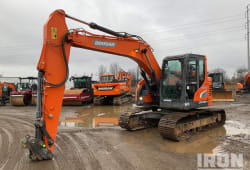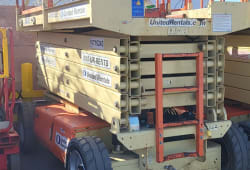Enhancing Material Management on Construction Sites
12 Min read
)
August 11, 2023
In the construction industry, efficient material management plays a vital role in the overall success of a project. Construction sites are often dynamic and complex environments, requiring careful planning and coordination to ensure that materials are available when needed and in the right quantities. By understanding the importance of material management and implementing effective strategies, construction companies can optimize their operations and improve project outcomes.
Understanding the Importance of Material Management in Construction
Material management encompasses the processes and activities involved in the planning, procurement, storage, and distribution of materials on construction sites. It involves ensuring that the right materials are available at the right time, in the right quantities, and in the right condition. Effective material management contributes to the overall efficiency, productivity, and profitability of construction projects.
The Role of Material Management in Construction
Material management is essential for several reasons. First, it ensures that construction activities can proceed smoothly and without unnecessary delays. By having materials readily accessible, workers can complete their tasks on time and without idle waiting periods. This not only improves project timelines but also enhances worker morale and job satisfaction.
Moreover, proper material management helps reduce the risk of project disruptions and cost overruns. When materials are well-managed, construction companies can avoid delays caused by waiting for deliveries or searching for misplaced items. This allows for a more efficient workflow and enables the project to stay on schedule and within budget.
Second, material management helps control costs. By accurately estimating the required quantities of materials, construction companies can avoid wastage and minimize inventory carrying costs. This not only saves money but also reduces the environmental impact associated with excessive material consumption.
Furthermore, effective material management allows for better negotiation with suppliers, leading to potential cost savings. By maintaining good relationships with suppliers and having a clear understanding of material requirements, construction companies can negotiate favorable pricing and terms. This can result in significant cost reductions and improved project profitability.
Third, material management contributes to workplace safety. Construction sites can be hazardous, and improper handling or storage of materials can lead to accidents or injuries. By implementing proper material management practices, companies can improve safety conditions for their workers and reduce the risk of workplace incidents.
For example, storing materials in designated areas and ensuring proper labeling and signage can prevent trips, falls, and collisions. Additionally, training workers on safe material handling techniques and providing them with the necessary personal protective equipment (PPE) can further enhance workplace safety.
The Impact of Poor Material Management
On the other hand, poor material management can have detrimental effects on construction projects. Delayed deliveries, incorrect materials, and inadequate quantities can lead to schedule disruptions and project delays. This can result in additional costs, contractual disputes, and damage to a company's reputation.
Furthermore, ineffective material management can lead to wastage and increased material costs. Excess materials that are not properly stored or protected can be damaged or lost, resulting in unnecessary expenses. Inefficient material handling and distribution can also cause unnecessary transportation costs, as materials may need to be reordered or relocated due to poor planning or organization.
Poor material management can also drive up workplace safety risks. Inadequate storage, lack of preventive measures, and uncontrolled material movements can contribute to accidents, injuries, and even fatalities on construction sites. This not only poses a threat to workers' lives but also exposes construction companies to legal liabilities and potential lawsuits.
In conclusion, material management plays a crucial role in construction projects. It ensures the timely availability of materials, controls costs and promotes workplace safety. By implementing effective material management practices, construction companies can optimize project performance, enhance profitability, and create a safer work environment for their employees.
Strategies for Effective Material Management
Implementing effective material management strategies is crucial for optimizing construction site operations. By adopting the following approaches, construction companies can enhance their material management processes.
Implementing a Material Management Plan
Developing a comprehensive material management plan is essential. This plan should include a detailed inventory management system that tracks the movement and usage of materials. It should also establish clear procedures for stock replenishment, storage, and delivery.
With a well-defined plan in place, construction companies can coordinate better with suppliers, ensuring a steady supply of materials. By accurately tracking the movement and usage of materials, they can identify trends and patterns, allowing for efficient allocation of resources. Additionally, having clear procedures for stock replenishment, storage, and delivery enables construction companies to anticipate potential material shortages or delays, and take proactive measures to mitigate any adverse effects.
Furthermore, a comprehensive material management plan enables construction companies to maintain effective communication with stakeholders. By providing a clear roadmap for material management, they can foster collaboration and ensure the smooth flow of materials throughout the project lifecycle.
Utilizing Technology in Material Management
Embracing technology can greatly enhance material management processes. Construction companies can leverage materials management software and tools to streamline inventory management, track material utilization, and monitor supplier performance.
By implementing materials management software, construction companies can automate various tasks, such as recording material movements and generating reports. This not only saves time but also reduces the risk of human error in inventory management. The software can also provide real-time visibility into material availability, allowing project managers to make data-driven decisions.
In addition to software, construction companies can also explore the use of barcode or RFID technology to improve material traceability. By tagging materials with barcodes or RFID tags, companies can easily track their location and movement throughout the construction site. This not only increases efficiency but also reduces the risk of misplaced or lost materials.
Furthermore, construction companies can consider integrating drones or autonomous robots into their material management practices. Drones can be used for aerial surveys to assess material requirements and monitor stock levels. Autonomous robots can assist in material handling and transportation, reducing the need for manual labor and improving overall efficiency.
By utilizing technology in material management, construction companies can streamline processes, reduce costs, and minimize risks. The integration of software, barcode or RFID technology, and drones or autonomous robots can revolutionize the way materials are managed on construction sites.
Case Studies of Successful Material Management
Examining case studies of successful material management practices can provide valuable insights and inspiration for construction companies looking to optimize their operations.
Case Study 1: Large-Scale Construction Project
In a large-scale construction project, effective material management was a key driver of success. The project team established a central warehouse for storing and distributing materials. They implemented an automated inventory system that integrated with suppliers' systems, ensuring real-time updates on stock availability.
This automated inventory system utilized barcode scanning technology, allowing for efficient tracking and management of materials. Each item was assigned a unique barcode, which was scanned upon receipt, storage, and usage. This not only improved accuracy but also enabled the project team to quickly locate and retrieve specific materials when needed.
Furthermore, the central warehouse was strategically organized, with materials categorized and labeled for easy identification. This layout optimization reduced the time spent searching for materials, maximizing on-site productivity.
By implementing these measures, the project team reduced material waste, improved delivery times, and enhanced on-site productivity. The availability of accurate and up-to-date inventory data allowed for streamlined planning and reduced lead times.
Case Study 2: Small-Scale Construction Project
In a small-scale construction project, the use of cloud-based project management software revolutionized material management. The software provided a centralized platform for stakeholders to monitor and coordinate material requirements.
With the cloud-based software, the project team had real-time visibility into material orders, deliveries, and consumption. This allowed them to proactively manage inventory levels and ensure timely replenishment. The software also provided automated alerts for low stock levels, preventing any potential delays or disruptions in the construction process.
In addition to inventory management, the software included features for tracking material usage and wastage. On-site personnel could easily record and update this information through a mobile application. This real-time data entry eliminated the need for manual paperwork and reduced the chances of errors or discrepancies.
Furthermore, the cloud-based software facilitated seamless collaboration among project team members. They could share important documents, such as material specifications and safety data sheets, ensuring everyone had access to the necessary information. This improved communication and coordination, leading to increased efficiency and reduced rework.
In conclusion, these case studies demonstrate the importance of effective material management in construction projects. Whether on a large scale or small scale, implementing innovative solutions such as automated inventory systems and cloud-based software can significantly optimize operations, reduce waste, and improve overall project outcomes.
Challenges in Material Management on Construction Sites
While effective material management is crucial, it is not without its challenges. Construction companies must be aware of potential obstacles and develop strategies to overcome them.
Construction projects are complex endeavors that require careful planning, coordination, and execution. One of the key challenges in material management is dealing with material waste. Construction sites often generate significant amounts of waste, which can occur due to improper handling, over-ordering, or inadequate storage conditions.
Minimizing material wastage requires a proactive approach. Construction companies must carefully monitor inventory levels to avoid over-ordering and ensure that materials are used efficiently. Implementing effective quality control measures is also essential to minimize the risk of using subpar materials that may lead to rework or project delays.
It is equally important to train workers on proper handling techniques to prevent damage or loss of materials. By investing in training programs, construction companies can equip their workforce with the necessary skills and knowledge to handle materials safely and efficiently.
Furthermore, construction companies can explore recycling or repurposing options for certain materials. This not only reduces the overall environmental impact but also has the potential to generate cost savings. By implementing recycling programs or partnering with recycling facilities, construction companies can divert materials from landfills and contribute to a more sustainable construction industry.
Another challenge in material management is managing supply chain disruptions. The construction industry is susceptible to supply chain disruptions due to various factors such as natural disasters, geopolitical events, or supplier bankruptcies. These disruptions can have a significant impact on material availability, price fluctuations, and lead times.
To mitigate the effects of supply chain disruptions, construction companies can develop contingency plans. These plans should include alternative sourcing options and backup suppliers. By establishing relationships with multiple suppliers, construction companies can diversify their supply chain, reducing reliance on a single source. This not only minimizes the impact of disruptions but also ensures a steady flow of materials, enabling construction projects to stay on schedule.
In addition to contingency plans, construction companies can also leverage technology to enhance material management. Implementing supply chain management software allows for real-time tracking of materials, enabling better visibility and control over the entire supply chain. This technology can help construction companies anticipate potential disruptions and make informed decisions to mitigate their impact.
In conclusion, effective material management is essential for successful construction projects. By addressing challenges such as material wastage and supply chain disruptions, construction companies can optimize their operations, reduce costs, and improve project outcomes.
Future Trends in Material Management
As technology continues to evolve, the future of material management in construction holds promising opportunities. Let's explore some of the key trends that are shaping the industry.
The Rise of AI and Robotics in Material Management
Artificial intelligence (AI) and robotics are poised to revolutionize material management processes. AI-powered systems can analyze historical data and predict material requirements, optimizing inventory levels and streamlining procurement processes.
Imagine a construction site where AI algorithms continuously monitor material consumption patterns, weather conditions, and project schedules. Based on this data, the system can automatically generate accurate material forecasts, ensuring that construction projects have the right materials at the right time.
Robotic automation can enhance material handling and transportation on construction sites. Autonomous robots can efficiently move materials, reducing the physical strain on workers and increasing overall productivity. These robots can navigate through complex environments, avoiding obstacles and optimizing routes, ensuring that materials are delivered promptly.
Furthermore, robots equipped with sensors can detect potential safety hazards, such as unstable scaffolding or hazardous materials, and alert workers, contributing to a safer work environment.
By embracing these technologies, construction companies can further optimize their material management practices, improving efficiency, reducing costs, and enhancing workplace safety.
Sustainable Practices in Material Management
The construction industry is increasingly embracing sustainability, and material management plays a crucial role in this transformation. Construction companies can adopt sustainable practices by prioritizing the use of environmentally friendly materials, reducing waste generation, and implementing effective recycling programs.
One approach to sustainable material management is the adoption of modular construction methods. By prefabricating building components off-site, construction companies can minimize material waste and reduce the environmental impact of construction projects. Additionally, modular construction allows for efficient material reuse, as components can be disassembled and repurposed in future projects.
Furthermore, construction companies can explore innovative solutions such as circular economy principles, where materials are recycled, repurposed, or reused to minimize the reliance on finite resources. For example, waste materials from one construction project can be transformed into raw materials for another project, creating a closed-loop system.
By integrating sustainable practices into material management, construction companies can reduce their environmental impact, enhance their corporate image, and contribute to a more sustainable future.
In conclusion, optimizing material management is vital for construction companies to maximize efficiency, minimize costs, and ensure project success. By understanding the importance of material management, implementing effective strategies, and leveraging technology, construction companies can overcome challenges and improve their operations. As the industry continues to evolve, embracing future trends such as AI and robotics, as well as sustainable practices, will further enhance material management practices and contribute to the overall success of construction projects.

Mike Kennedy is Boom & Bucket's Marketplace Operations Manager, where he leads shipping, warranties, and post-sale operations to create a seamless buyer experience. As one of the company's earliest team members, Mike helped build the foundation of Boom & Bucket's operations and guided its growth through acquisition by RB Global. He is passionate about scaling marketplaces, solving operational challenges, and improving efficiency to deliver industry-leading results.














